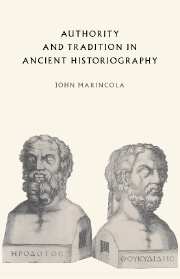Book contents
- Frontmatter
- Contents
- Preface
- List of abbreviations
- INTRODUCTION
- I THE CALL TO HISTORY
- II THE HISTORIAN'S INQUIRY
- III THE HISTORIAN'S CHARACTER
- IV THE HISTORIAN'S DEEDS
- V THE ‘LONELY’ HISTORIAN: CONTRAST AND CONTINUITY
- CONCLUSION
- Appendices
- I Table of historians
- II Name and nationality
- III Isocrates on autopsy and inquiry?
- IV Variant versions
- V The Roman convention of ‘nos’ and ‘nostri’
- VI Greek continuators
- VII Roman continuators
- Bibliography
- Index locorum
- Index of Greek words
- General index
IV - Variant versions
Published online by Cambridge University Press: 29 January 2010
- Frontmatter
- Contents
- Preface
- List of abbreviations
- INTRODUCTION
- I THE CALL TO HISTORY
- II THE HISTORIAN'S INQUIRY
- III THE HISTORIAN'S CHARACTER
- IV THE HISTORIAN'S DEEDS
- V THE ‘LONELY’ HISTORIAN: CONTRAST AND CONTINUITY
- CONCLUSION
- Appendices
- I Table of historians
- II Name and nationality
- III Isocrates on autopsy and inquiry?
- IV Variant versions
- V The Roman convention of ‘nos’ and ‘nostri’
- VI Greek continuators
- VII Roman continuators
- Bibliography
- Index locorum
- Index of Greek words
- General index
Summary
An examination of how historians choose from among variant versions sheds some light on the methodology assumed in writing non-contemporary history. As we noted at the outset, the historian differs from the Homeric narrator by his lack of omniscience. Unlike the poet, the historian does not know all, nor does he pretend on each occasion to be able to explain motivation or cause. We may term this entire phenomenon ‘narrative uncertainty’, and it can be as brief as a few words (‘either willingly or unwillingly’), or as lengthy as a full digression and refutation. In the latter cases, one can sometimes find methodological pronouncements. The material will repay a full study, and I present here only an overview of those occasions when the historian explicitly cites two (or more) versions and ascribes them either to unnamed authorities (‘some say’, ‘others believe’, ‘there are some who write’) or to named sources whom he is (presumably) following in part or in toto, and then chooses one over the other. This type gives insight into an historian's methodology. In those cases where an historian does more than merely record the variants, we may note a few recurring ways of choosing or preferring one version over another. For each of these I have given a only few examples, but they are nevertheless typical.
- Type
- Chapter
- Information
- Authority and Tradition in Ancient Historiography , pp. 280 - 286Publisher: Cambridge University PressPrint publication year: 1997



